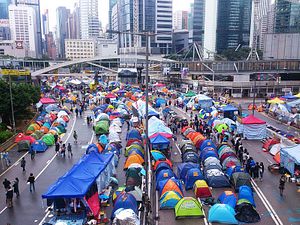It is one of the great clichés of modern politics: in the early 1970s, when Chinese Premier Zhou Enlai’s was asked about the French Revolution, he replied that it was “too early to say what it meant.” That statement has been trotted out as cast-iron proof that savvy Chinese leaders take a long-term view on things. The shine on the story has been taken off by more prescient interpretations that link Zhou’s statements not to the events of the 1790s but to the protests that rocked Paris in 1968. To this day, no one really knows to which event Zhou was referring.
It is certainly too early to say what the Hong Kong 2014 protests might mean, particularly as they are still ongoing. But at least the electorate in Taiwan seem to have made their minds up pretty early, deciding that the events in Hong Kong show clearly that the mainland cannot be trusted. In a damning judgment on the ruling KMT’s record over the last few years, and in particular its policy toward China, results in local elections across the island on Saturday returned the worst set of results that the KMT has ever had. KMT strongholds like Taipei fell to an independent largely seen as far closer to the Democratic Progressive Party (DPP) than the other side. Elitist candidates like Sean Lien were unceremoniously rejected. Of the 22 contested seats, the KMT managed to scrape up just six. The first scapegoat was Premier Jiang Yi-huah, who resigned almost as soon as the scale of the defeat became clear. But President Ma’s many enemies are now clearly gunning for him.
Taiwanese politics are complex. The two established parties, which dominate the current establishment, make everything look misleadingly simple. Underneath the surface, however, there is a rich, complex universe of shades of opinion and divided loyalties and convictions. These divisions map the complexity of Taiwanese society itself, created over many decades of migration and internal integration. In this context, we need to resist oversimplified interpretations.
Even so, there are clearly two major forces at work. The first is a theme universal to elections across the world, and that is angst about the sluggish economy. Taiwanese evidently see little real results from the politics adopted by the government to kick start the economy after the disaster of 2009, when the global financial crisis decimated local growth. Youth unemployment is high, job security poor, and living costs rising. The competence of the government has been put into question by food safety failures. Taiwan has a low feel-good factor at the moment, despite the respectable four percent growth posted so far this year.
And economic worries links to the second big issue — and the current protests in Hong Kong. If there has been one signature policy of President Ma since he came to office in 2008, it is that harmonious relations with the mainland are in the island’s interests. On this basis, Ma went to the limits of his mandate by agreeing to the Economic Cooperation Framework Agreement (ECFA) in 2010, and trying to finalize the services trade agreement earlier this year. The opposition to the latter precipitated the unprecedented series of protests in March and April now dubbed the Sunflower Movement.
The cursory treatment of Hong Kong and its political future by the Beijing leadership, at least in Taiwanese eyes, only reinforces the narrative that Taiwan has already ceded too much, that reliance on the mainland alone for economic prosperity is naïve. While President Xi and his colleagues in China might feel that on the whole they have got what they wanted in Hong Kong, they also have to consider the collateral damage: that their actions in Hong Kong have almost certainly made any future conciliatory moves with Taiwan harder, and perhaps impossible in the next few years. This election result is the earliest of what is likely to be a series of paybacks.
The DPP can pat themselves on the back and feel that the 2016 presidential elections are theirs for the taking. Before they uncork the champagne bottles, however, they also have to reflect on how best to interpret the results. The simple fact is that Taiwan’s economic fate is now inextricably linked to the mainland. While his presentation might have been poor, President Ma was only pursuing a pragmatic path. The electorate have judged this a failure, but it is hard to know what else might work beyond outright confrontation — and the risks of that going wrong are horribly high. To steal Zhou Enlai’s words, it really is too early to say what the Taiwan elections and Hong Kong protests mean, but the signs are looking more and more ominous. It is clear that events are setting up for at best a prolonged confrontation, and at worst an outright clash.
































